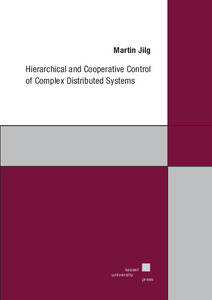| dc.date.accessioned | 2023-06-09T10:19:48Z | |
| dc.date.available | 2023-06-09T10:19:48Z | |
| dc.date.issued | 2018 | |
| dc.identifier | doi:10.19211/KUP9783737604550 | |
| dc.identifier.isbn | 978-3-7376-0455-0 (e-book) | |
| dc.identifier.uri | urn:nbn:de:0002-404554 | |
| dc.identifier.uri | http://hdl.handle.net/123456789/14810 | |
| dc.description | Zugleich: Dissertation, Universität Kassel, 2017 | |
| dc.language.iso | eng | |
| dc.publisher | kassel university press | |
| dc.rights | Urheberrechtlich geschützt | |
| dc.rights.uri | https://rightsstatements.org/page/InC/1.0/ | |
| dc.subject.ddc | 620 | |
| dc.title | Hierachical and Cooperative Control of Complex Distributed Systems | eng |
| dc.type | Buch | |
| dcterms.abstract | In this thesis, a theory of hierarchical and cooperative feedback control for spatially distributed, physically interconnected systems is developed. A particular requirement is that the resulting control laws are suitable for a distributed implementation, meaning that the subsystems are equipped with local controllers and exchange information via a communication network. Distributed control schemes steadily gain practical significance, since an ever increasing number of technical systems, like power networks or manufacturing systems, is comprised of an interconnection of subsystems. In combination with competitive, powerful embedded computers and modern communication technology, a distributed implementation of control algorithms intuitively makes sense for such types of systems. When designing distributed control algorithms, an immediate question is how to select an appropriate communication topology for connecting the local controllers. While classical approaches typically propose schemes with fixed communication structures, some modern approaches consider the communication topology underlying the distributed controller as an additional degree of freedom for the control design. However, these approaches often suffer from the combinatorial complexity arising from the binary decisions whether to activate a link within the communication topology or not. While some approximation techniques exist in order to deal with this complexity, the hierarchical control structures have not yet been considered as a possible remedy. It is the main goal of this thesis to close this gap by combining ideas from the domains of system decomposition, hierarchical control, and simultaneous control and communication topology design. In particular, a two-layer distributed control scheme for time-invariant interconnected dynamic systems is proposed. Prior to the control design, the system structure is analyzed. Based on the result of this analysis, the structure of the distributed controller can be adopted to the structure of the interconnected system. Common control goals are either encoded by a global quadratic cost function or by a system norm with respect to a global controlled variable, and the local controllers on both layers are designed to cooperate for optimizing the performance index. In the above scheme, the controllers on the upper control layer synchronously operate on a coarser time-scale compared to the lower control layer. In order to improve the distribution of the exchanged data over time, an extension of the scheme considering asynchronous communication is presented. Distributed frequency control of a power network serves as an application example for the synchronous and asynchronous two-layer scheme. In the last part of this thesis, the approach is extended to a class of uncertain interconnected dynamic systems. More precisely, interconnected jump Markov and jump semi-Markov systems are considered, which allow to model stochastic abrupt changes of the system behavior. Starting from a monolithic partitioned model, it is shown how distributed single- and two-layer controllers can be designed for such types of interconnected systems, where a particular requirement is to respect information constraints w.r.t. the local Markov states. | eng |
| dcterms.accessRights | open access | |
| dcterms.creator | Jilg, Martin | |
| dcterms.dateAccepted | 2017-12-07 | |
| dcterms.extent | viii, 217 Seiten | |
| dc.contributor.corporatename | Kassel, Universität Kassel, Fachbereich Elektrotechnik / Informatik | ger |
| dc.contributor.referee | Stursberg, Olaf (Prof. Dr.-Ing.) | |
| dc.contributor.referee | Raisch, Jörg (Prof. Dr.-Ing.) | |
| dc.publisher.place | Kassel | |
| dc.relation.isbn | 978-3-7376-0454-3 (print) | |
| dc.subject.swd | Hierarchische Regelung | ger |
| dc.subject.swd | Verteiltes System | ger |
| dc.subject.swd | Komplexes System | ger |
| dc.subject.swd | Lineares zeitinvariantes System | ger |
| dc.subject.swd | Zeitgesteuertes System | ger |
| dc.subject.swd | Verbindungsstruktur | ger |
| dc.subject.swd | Unsicherheit | ger |
| dc.subject.swd | Markov-Sprungprozess | ger |
| dc.subject.swd | Subsystem | ger |
| dc.subject.swd | Reglerentwurf | ger |
| dc.type.version | publishedVersion | |
| kup.iskup | true | |
| kup.price | 39,00 | |
| kup.subject | Naturwissenschaft, Technik, Informatik, Medizin | |
| kup.typ | Dissertation | |
| kup.institution | FB 16 Elektrotechnik / Informatik | |
| ubks.nodoigen | true | |
| kup.binding | Softcover | |
| kup.size | DIN A5 | |
| ubks.epflicht | true | |


